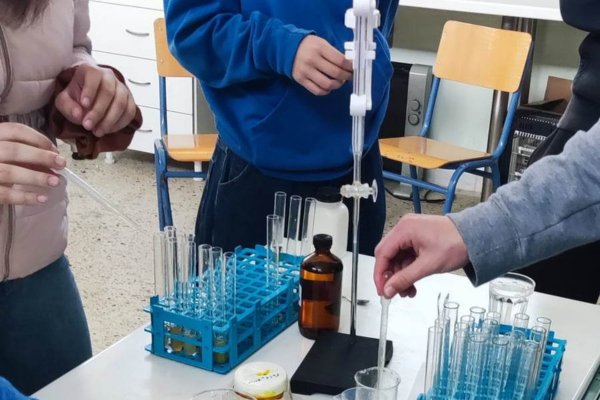
eTwinning projects on food and health in initial vocational education and training

Aspasia Mylona is an experienced eTwinner and vocational education and training (VET) teacher at the eTwinning school 1st Vocational High School of Nafpaktos (1st EPAL Nafpaktou) in Greece. As a vocational teacher specialising in health, nutrition and food science, she has led several eTwinning projects on these topics, including the 2024 European prize-winning "Natural is good, chemical is bad?"
This year, Aspasia is running a project entitled Mediterranean diet for overall health, which examines the cultural, health and sustainability aspects of the Mediterranean diet.
Nutrition and sustainability in practice
In this project, students learn to design healthy meal plans that focus on the nutritional benefits of foods, and explore diet-related health outcomes. This equips them with practical knowledge for future careers in health and food services.
The project also addresses sustainability. Students learn how to incorporate environmentally friendly practices into food production and consumption, which is a critical skill for the food and health industries.
Teachers and students working together
Teachers have collaboratively designed the course using WebQuests, refining it with feedback from pilot students to create a student-centred resource for the eTwinning TwinSpace.
Cooking workshops and diet planning activities in the project then give students hands-on culinary skills they need for future careers in food, nutrition and the hospitality sector.
Practical, collaborative and soft skills
Projects like these help students to develop research skills that can be used across VET fields including agriculture, food technology and environmental science.
By participating in collaborative projects and campaigns such as awareness days and student conferences, students learn about managing projects, organising events and working effectively in teams – vital skills for leadership roles in VET industries.
In addition, project activities like role-playing, debates and simulations develop students’ communication, teamwork and problem-solving abilities. These soft skills are essential, especially in customer-facing roles in tourism, healthcare and hospitality or food industries. Activities such as cooking workshops and diet planning also help students develop entrepreneurial skills, and encourage them to explore business opportunities in the health, food and tourism industries.
Aspasia Mylona engaging with her students in class
Students who participate in these projects often benefit from partnerships with local stakeholders, food enterprises, universities, nutritionists, dietitians, doctors and other experts, as well as with regional, national and UNESCO Associated Schools Network (ASPnet) schools.
Aspasia sees the transformative benefits of eTwinning for her students, explaining that they ‘get motivated by the new prospects for their future that the regular school activities and collaborative European projects bring to their life.’
Additional information
-
Education type:Vocational Education and Training
-
Target audience:TeacherStudent TeacherHead Teacher / PrincipalTeacher Educator
-
Target audience ISCED:Upper secondary education (ISCED 3)Post-secondary non-tertiary education (ISCED 4)

